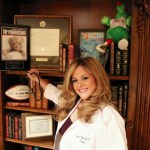Nothing elicits a surge in my skeptic meter like the term world-renowned when used in the medical realm. Especially since it is typically self-described by those selling something, routinely an unnecessary product or procedure.
Those who are authentically world-renowned, who are the real deal, rarely boast about it. Shameless self-promotion is a tough thing for the more earnest medical and science professionals. With the ever-increasing competition today, striking the balance so as to garner enough interest in their work so they can pursue what they so incredibly cherish is often an unnatural road.
Being exactly who you say you are, nothing more and nothing less, reflects the best there is in medicine. This way of navigating the profession prioritizes patient safety and manages expectations, while displaying genuine empathy and compassion. It facilitates truly informed consent and avoids delays in care.
And, thankfully, many influential organizations are starting to take notice of the importance of cultivating a truth in advertising culture. Not quite a groundswell, but stopping consumer fraud in all its forms is gaining some momentum in the medical sphere. In FDA To Change How Prescription Drugs And Biologics Are Advertised, I discuss how with direct-to-consumer (DTC) ease of communication access today, product overstatements of health benefits with simultaneous minimization of possible harms have become the norm for such companies marketing to the public. In response, the federal agency wants to intervene to be assured the sanctity of the doctor-patient relationship is being preserved while a societal wave of unfounded fears doesn’t add to risk aversion preventing a person from seeking appropriate treatment or being compliant with his medical care.
In The Word 'Doctor' May Not Mean What You Think It Means, I address that with the ever-changing healthcare landscape there is an onslaught of terms like clinician, advanced practitioner, or provider intended to mislead patients as to who is in charge of their care. Given that not every member of their treatment team has interchangeable training, when it comes to invoking the term doctor it is important for patients to be informed of disparate levels of expertise. The American Medical Association (AMA) has gone so far as to start an initiative, the “AMA Truth in Advertising Campaign is designed to ensure health care providers clearly and honestly state their level of training, education and licensing.”
It can be hard to distinguish fact from fiction, especially with the never-ending technologies being designed to understand our purchase habits and behaviors. Tack onto that the worry and vulnerability that comes with being sick. The combination can be a perfect storm for the slickest of salesmen to sweep in and derail a dream. (See here and here for egregious stem cell practices and the FDA’s efforts to curtail them here).
How do we tell the difference?
Start by paying attention to those professionals who might be more quietly effective. In the health sphere, it can spare you avoidable harm and worry, false hope and stressful financial loss.
Question and be discerning with the shiny objects. These master marketers abound amid the sea of escalating profit centers in health care. And, often go unchecked. If interested or curious about pursuing different options, then discuss your plans with your own trusted physician who can help you navigate them.
Not all influencers, thought leaders and world-renowned are the same. Be wary of such labels. Often bestowed on beefed-up backgrounds, Instagram likes and graduates of intensive public speaking training with well-packaged delivery, their raw goods might not support the facade. Scratch the surface.
Years ago, the first time I appeared on television as a medical expert it was live, international news. After this, I received requests from other networks. Whenever I inquired how they found out about me, the responses ranged from “we watched you all summer on such-and-such channel” to “you are perfect for our demographic.” Re-vetting my credentials did not seem to be a universal theme, nor an apparent priority for some outlets. By many I have encountered in the green room in television over the years or observed as an audience member, it is clear there can be an acceptable bell curve of legitimacy if you can speak in sound bites or possess a knack to be polarizing etc. Often those individuals get the loudest megaphone.
In medical practice, I often encountered public confusion and misinformation espoused by the so-called and typically self-proclaimed world-renowned. The consistent theme was always the exorbitant prices they charged along with the physical costs their “treatments” or “recommendations” could induce.
The examples are endless and the time consumed in the doctor’s office visit debunking these myths a very real and untoward effect. Some make pathological normal childhood development and manufacture conditions that must apply to all children so as never to limit the services a so-called “world-renowned” expert can provide. Others instruct “patients” to go to their regular doctor to insist on a litany of blood tests that not only would require way too much blood volume to collect at one time, but also have no clinical correlation or relevance to the patient, could do harm and put an individual down an ill-advised trajectory.
Whenever I would engage in discussion about these unusual requests, the refrain was always the person was "world-renowned, a leading expert." Baffled by why certain specific tests they suggested had no applicability, I would readily discover with the help of Google or a direct phone call that the “expert” was not even a medical doctor or with any significant clinical experience, appropriate or related training. That's why they could not order the desired testing themselves and lacked a fundamental understanding of the utility of such tests in the first place.
Sadly, we live in a time where getting a number one bestseller can be manufactured or the right public relations machine can act as accelerants for the spread of bad ideas and misguided, harmful messaging. There are road maps and consultants and those whose entire purpose is to optimize search engine listing and garner viral accolades. So much for dedication to the superficial. Camera readiness and page views are trumping the most sound, measured guidance.
Fortunately, despite the unlikelihood of the status-quo-overselling-brigade to diminish any time soon, there are countless medical professionals who take very seriously approaching their work with a core ethical standard and integrity. It is actually a wonderful thing that we live in a time where Google is a click away, so next time it feels like someone wants to sell you a bill of goods in healthcare, trust that feeling and be a bit discerning.
Recognizing the media is a powerful tool, I find it heartening that there are plenty of ways to exert a positive influence. I am not alone and am encouraged by many other faces I see throughout all forms of media who are who they say they are. The challenge for all of us is to empower ourselves to be able to tell the difference from those who over promise and under deliver.
Revolutionary, disruptive, life-changing and world-renowned should be a trigger to do a little research, especially if all these words are found in one paragraph on their site. A celebrity endorser should set off some alarm bells to do a little more digging.
No matter the media form, those who walk the talk typically encourage second opinions or digging deeper --as they have nothing to hide. Ask your provider questions if you perceive a gap or something doesn’t make sense. There is no therapeutic and successful doctor-patient relationship without a foundation of trust. The beauty in that is it works both ways with each cog in the wheel sharing a common goal of your improved health and well-being.

